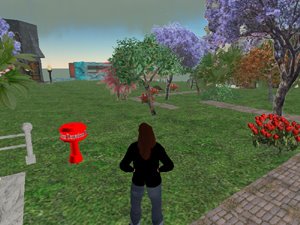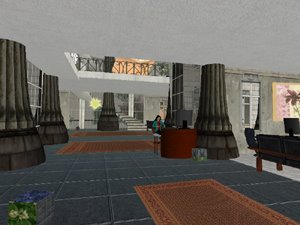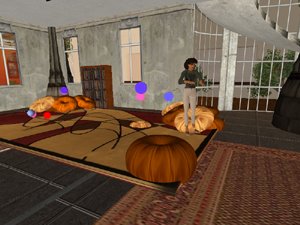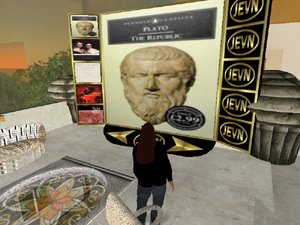My previous
post about enabling a virtual library in Second Life and this
post yesterday at DigiCMB made me want to learn more, so I wandered http-wise over to the Second Life Library 2.0
blog and followed their SLurl
link.

Arriving SL-wise, I found myself surrounded by some lovely shrubbery and a donation box. Entering the library I was greeted by a librarian (Seraphima Salsman) sitting at the reference desk. Later we were joined by another librarian (Curious Witte) who appeared as a glowing sphere (I'm envious as I've always wanted to be a glowing sphere).

The library is very nice, although it is undergoing construction. Virtual construction is far easier on the auditory system than RL construction as I was not assaulted by the sounds of jackhammers as I am in the real world. Here a designer (Lorelei Junot) has just added a lovely cushiony seating area for a test.

On the roof is a viewing area, with some seats and a large screen (to show the Superbowl in HiDef?) and what looked like an addition to the library. Turns out it was a book vendor who had set up shop on the roof to charge for some rather old texts like Plato's The Republic (copyright doesn't last that long, does it?).

The contents of the library are fairly small right now, but will continue to grow into the future. My question was, what process did they use to get the texts into SL? Were these texts already in digital format, and just needed to be converted, or were they converted solely for the purpose 0f this project?
What I was really interested in, but did not have time to get into, is the idea of information architecture. How can people use the virtual space to organize and present information in a meaningful way? Are there ways that go beyond what can currently be done in RL so that information processing occurs more rapidly and seamlessly. In a current library you can search a card catalog, browse the books on a shelf, ask a librarian for help, or do the search digitally (the most common way now) on a computer. However, what you get back, in the case of your standard community library is a book. Now don't get me wrong, I love books and have many on the bookshelf behind me. However, for the purpose of presenting information, they leave a little to be desired. You can't search within a book, for example. Well, you can, by using an index (if it has one), but the combersome method of flipping back and forth from the index, trying to find the correct term (for the book, which may or may not be what you imagined it) and the text is painful. Who wouldn't love a google search option built on top of the cover? Or an interface like Hitchhiker's Guide to the Galaxy? Or better yet a voice recognition system like the one in Star Trek?
This problem becomes even more dramatic when we are dealing with more complicated data than simple fiction, or even textbooks. There is an enormous amount of data that exists in the digital realm, and I think utilizing the virtual world to organize it cohesively, present it as more than just a representation in RL (which would be flawed, since most digital data is shown flat on a 2D computer screen), and bring about something like the Cyberspace idea envisioned in William Gibson's cyberpunk books is the way forward. It will be interesting once Linden Labs gets web access into SL and seeing what people do with that. The Shifted Librarian (I can read the
blogpost now!) has some of the same questions. However, just recreating the web in SL is only one step, and a larger one is reconfiguring the interface and content for a full-blown 3D representation (and no, that doesn't mean recreating a computer monitor in SL - mirrors of mirrors we do not need).













